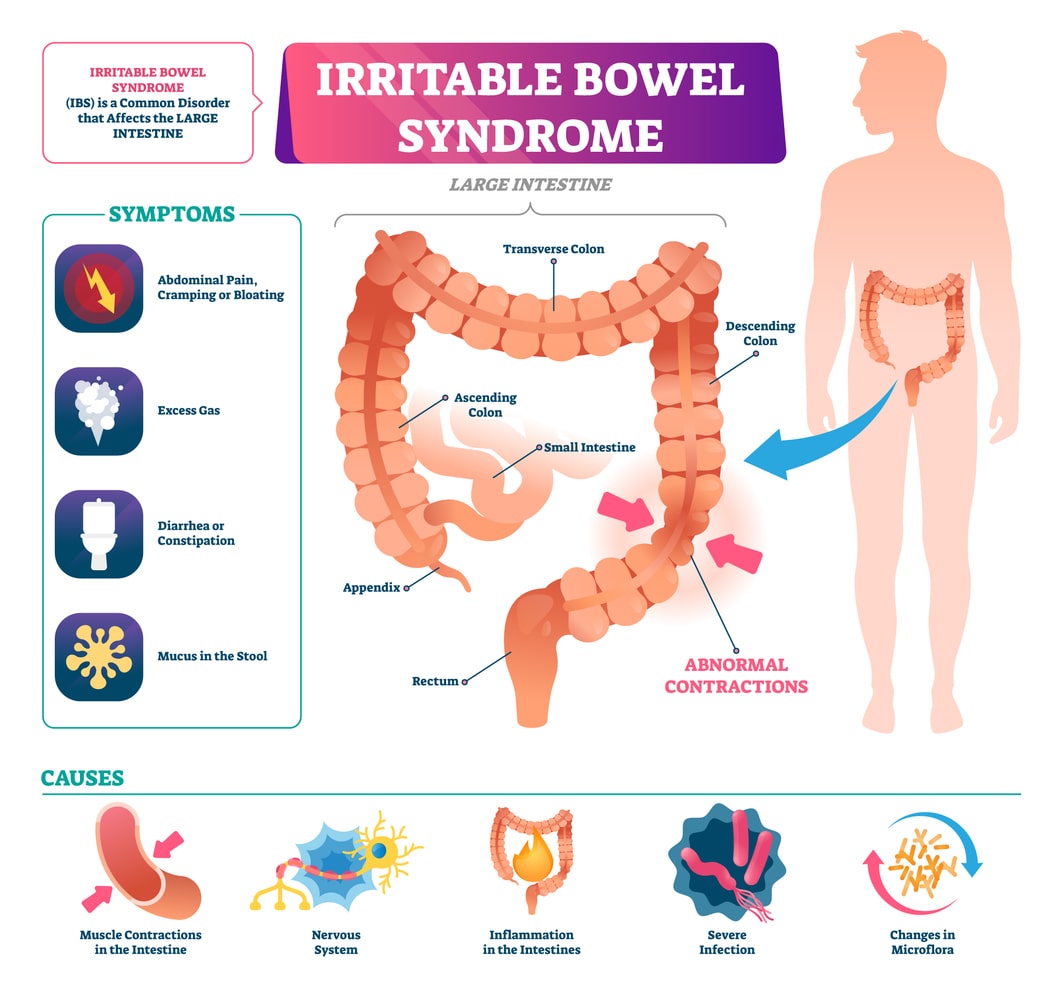
Unveiling the Truth: Do I Have IBS?
Irritable bowel syndrome (IBS), a common disorder affecting the large intestine, presents a unique challenge due to its diverse and sometimes elusive symptoms. Understanding whether you may have IBS requires a nuanced approach, as symptoms can vary widely from person to person.
We will dive into the intricacies of IBS, exploring its symptoms, potential causes, and how to recognize if you might be experiencing this often misunderstood condition. Whether you’re seeking clarity for your digestive concerns or aiming to support a loved one on their journey to wellness, this blog sheds light on the signs and symptoms of IBS so you can take control of your gastrointestinal health.
Recognizing the Symptoms of IBS
Symptoms can vary significantly among individuals but commonly include:
- Abdominal Pain or Cramping: Individuals with IBS often experience recurrent abdominal pain or discomfort, typically located in the lower abdomen, that may be relieved by passing stool or gas.
- Changes in Bowel Habits: IBS can cause alterations in bowel habits, such as diarrhea, constipation, or a combination of both (alternating diarrhea and constipation). These changes may occur frequently and persist over time.
- Bloating and Gas: Many individuals with IBS report feeling bloated or gassy, which can contribute to discomfort and abdominal distension.
- Altered Stool Consistency: Stool consistency may vary in individuals with IBS, ranging from loose or watery stools (diarrhea-predominant IBS) to hard, lumpy stools (constipation-predominant IBS).
- Urgency: Some people with IBS experience a sense of urgency to have a bowel movement, often accompanied by the fear of not making it to the restroom in time.

Identifying IBS Triggers
Identifying triggers for IBS can be a crucial step in managing symptoms and improving overall quality of life. While triggers vary from person to person, common factors that may exacerbate IBS symptoms include certain foods and beverages, stress, hormonal changes, and disruptions in routine or sleep patterns. Keeping a detailed food diary and noting any changes in symptoms can help identify specific dietary triggers, such as spicy foods, dairy products, caffeine, or high-fat meals. Practicing stress-reduction techniques such as mindfulness, yoga, or deep breathing exercises may help alleviate symptoms triggered by emotional stress. By identifying and avoiding triggers whenever possible, individuals with IBS can take proactive steps toward managing their condition and achieving symptom relief.
Here are a few practical steps to pinpoint and manage these triggers effectively:
Diet and Nutrition
- Common Irritants: Alcohol, caffeine, spicy or fatty foods, and certain high-sugar foods can exacerbate IBS symptoms. Processed foods, dairy products (especially for those with lactose intolerance), and foods high in fructose or sorbitol are also known to trigger discomfort.
- Fiber Intake: Gradually increase soluble fiber intake, aiming for 25-38 grams daily, from sources like whole-grain bread, fruits, and vegetables. Be cautious with insoluble fiber found in the skin of fruits and vegetables, as too much can worsen symptoms.
- Food Diary: Keep a detailed food diary to track what you eat and how it affects your symptoms. This can help identify specific trigger foods to avoid.
Lifestyle and Environmental Triggers:
- Stress Management: Stress and anxiety are significant triggers for IBS flare-ups. Techniques like mindfulness, yoga, or cognitive-behavioral therapy can help manage stress.
- Meal Habits: Eating smaller meals more frequently throughout the day can reduce the burden on your digestive system. Avoid eating too quickly or while distracted, as this can lead to overeating and increased symptoms.
- Beverage Choices: Limit your intake of carbonated drinks, alcohol, and caffeine. Opt for plain water and drink it an hour before or after meals (rather than during your meal) to aid digestion.
Managing IBS
Managing IBS involves a multifaceted approach to reduce symptoms and improve overall quality of life. Dietary modifications play a key role in managing IBS. Following a low-FODMAP diet limits certain fermentable carbohydrates that can trigger symptoms such as bloating, gas, and abdominal pain. FODMAP stands for Fermentable Oligosaccharides, Disaccharides, Monosaccharides, and Polyols, which are types of carbohydrates that are poorly absorbed in the small intestine and fermented by gut bacteria, leading to gastrointestinal symptoms in susceptible individuals.
Incorporating fiber-rich foods, such as fruits, vegetables, and whole grains, can help regulate bowel movements and alleviate constipation. Staying hydrated and avoiding large meals may help prevent bloating and discomfort. Stress management techniques, including relaxation exercises, mindfulness meditation, and regular physical activity, can be beneficial in reducing the impact of stress on gastrointestinal symptoms. Certain medications, such as antispasmodics, laxatives, or antidepressants, may also be prescribed by your GGO physician to help alleviate specific symptoms of IBS. Developing a personalized management plan in consultation with a healthcare provider, which may include a combination of dietary modifications, stress management techniques, and medication, can empower individuals with IBS to effectively manage their condition and improve their quality of life.
When to Seek Medical Advice
Seeking medical advice is crucial if you experience persistent or severe symptoms of IBS that interfere with your daily life. It’s important to consult your physician if you notice a significant change in your bowel habits, such as diarrhea, constipation, or alternating between the two, lasting more than a few weeks. If you experience persistent abdominal pain or discomfort, bloating, or significant changes in stool consistency, color, or frequency, it’s advisable to seek medical attention. Other red flags that warrant medical evaluation include unintended weight loss, rectal bleeding, fever, and symptoms that worsen at night or interfere with sleep. Early intervention and proper management can help alleviate symptoms, improve quality of life, and prevent potential complications associated with IBS.

Questions to Ask Yourself
When pondering the possibility of having IBS, it’s essential to self-examine your bodily patterns and symptoms. Here are some pivotal questions to guide your self-assessment:
Frequency and Nature of Symptoms:
- How often do you experience abdominal discomfort or pain?
- Do these sensations correlate with bowel movements?
Changes in Bowel Movements:
- Have you noticed alterations in your stool’s frequency, consistency, or appearance?
- Is there a presence of diarrhea, constipation, or an alternation between the two?
Impact on Daily Life:
- To what extent do these symptoms affect your daily activities or quality of life?
- Have you observed any patterns or triggers, such as specific foods, stress, or changes in routine, that exacerbate your symptoms?
Reflecting on these questions can provide valuable insights into your gastrointestinal health and whether the symptoms align with those typically associated with IBS. This self-assessment should not replace professional medical advice but can serve as a preliminary step in understanding your body’s signals and when to seek further evaluation.
Take Charge of Your Digestive Health
Irritable bowel syndrome is a complex and often challenging condition that can significantly impact daily life. From dietary modifications and stress management techniques to seeking medical advice when necessary, there are various steps you can take to alleviate symptoms and enhance your quality of life.
Working closely with your physician to develop a personalized management plan that addresses your unique needs and concerns is essential. If you’re seeking expert guidance and support in managing IBS, contact Gastroenterology of Greater Orlando today. Our team specializes in digestive health and offers compassionate care tailored to your individual needs. Schedule a consultation today and take control of your gastrointestinal health.